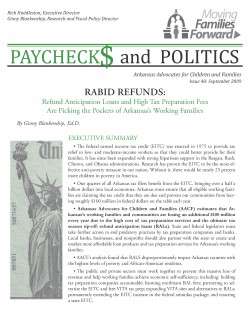
In public debates on taxes, it is often forgotten (or ignored) that the poor pay taxes just like everyone else. Not only do low-income working families pay a vast array of taxes—from payroll to sales taxes and from property taxes to driver’s license fees—but as a percentage of their income, they also pay far more than everyone else.
The federal earned income tax credit (EITC) was designed to help counter this injustice by supplementing the wages of the working poor and lessening their tax burden so that they could better provide for their families. Research has since proven the EITC to be the most effective anti-poverty measure in our nation. In the 2009 tax season alone, the EITC lifted more than five million individuals (including 2.6 million children) out of poverty and helped millions of additional low- and middle-class families weather the current economic storm. Through the federal economic stimulus package, the American Reinvestment and Recovery Act (ARRA) of 2009, even more working families will now benefit from an increased EITC, which could save millions more children from poverty nationwide.
However, the Internal Revenue Service estimates that 20 to 25 percent of all low-income tax filers are not claiming the credit that they are due, leaving millions of dollars on the table that could be going back into their pockets and stimulating local economies.⁴ What’s worse, too many working families are not reaping the full benefit of this tax credit due to the high cost of tax preparation services and falling prey to the ultimate tax season rip-off: refund anticipation loans (RALs). Given our state’s high poverty rate, Arkansas’s taxpayers and local economies cannot afford to lose any hard-earned dollars. Arkansas can stop the drain on our EITC dollars through simple policy changes and greater outreach—but only if advocates for children and families push for reform harder than the predatory lending industry pushes against it.
